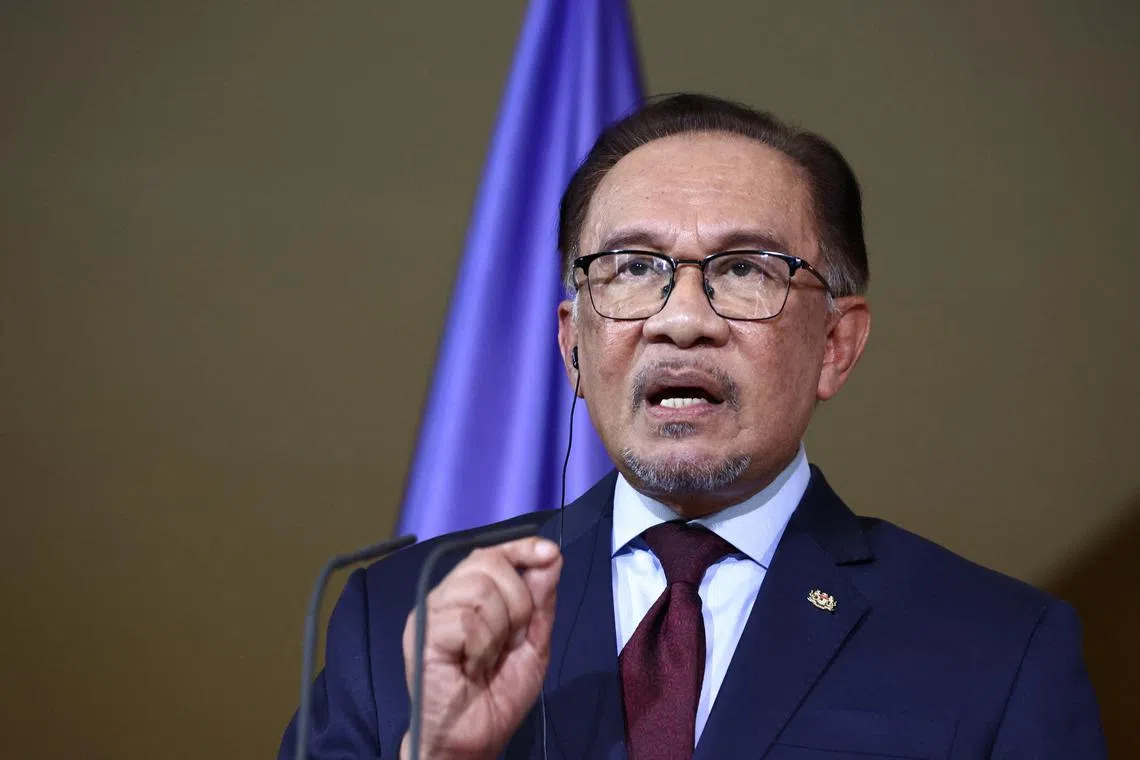Malaysian PM Anwar defends cutting diesel subsidies, prioritises public welfare
Sign up now: Get insights on the biggest stories in Malaysia

Malaysian PM Anwar Ibrahim said the money saved from the rationalisation policy will be “channelled back to the people”.
PHOTO: REUTERS
PUTRAJAYA – Malaysia’s government has shown strong political will in rationalising its diesel subsidies
Since June 10, Malaysia has cut diesel subsidies and floated retail prices
Datuk Seri Anwar said this issue had been discussed for years, and Malaysian prime ministers before him had also agreed that subsidy rationalisation must be implemented.
“However, it was not done before as it is not easy. Politicians usually consider the political impact before they decide to introduce policies.
“In the case of subsidy rationalisation and tax increase, the impact will be a burden to politics,” he said.
Addressing the Malaysian Finance Ministry’s staff at a monthly gathering, Mr Anwar, who is also Finance Minister, said implementing targeted subsidies for diesel meant that the majority of the people would continue to enjoy the subsidy, while the wealthy, foreigners and major industries would not benefit from it.
“The money saved from the rationalisation policy will not be used to increase ministers’ allowances. It will be channelled back to the people in terms of subsidies and cash aid,” he said.
Mr Anwar said he was aware that his detractors were using the promise he had made to bring down oil prices to criticise the implementation of targeted diesel subsidies, pointing out that the statement was made in 2008.
He said that back then, oil prices in Saudi Arabia might have been around 50 sen while Malaysia’s prices were around RM1.50.
“Now, ours is around RM2.05 and Saudi Arabia’s oil prices are in the region of RM2.95. How do you relate the cost in 2008 with the current cost?” he added.
He said the three major moves undertaken by the Malaysian government – electricity tariff adjustments, floating chicken prices, and implementing targeted diesel subsidies – would see savings of about RM10 billion (S$2.9 billion) a year.
“Those who are impacted by the diesel subsidy rationalisation can appeal for assistance. For instance, the vegetable farmers in Cameron Highlands will also be given subsidies, so that they will not have to raise prices of goods and burden the people,” he said.
Aware that not many leaders would want to take an action that is deemed unpopular, Mr Anwar said he wanted only the best for Malaysia.
“I want to prove that not all politicians are self-serving, arrogant, and do not think of the people. I want to prove that as a team, we can raise the good name of the country. I am convinced that this can be done.
“I have the mandate and I will do it. When the time comes and if I have to go, I will.
“But while I am here in office, I will stay and fight for what is right to make sure Malaysia emerges as a great nation,” he said.
The price of diesel in Peninsular Malaysia was set at RM3.35 per litre, effective from June 10 after it had been floated.
This was based on the unsubsidised market price, according to the automatic price mechanism formula in May.
For those in Sabah, Sarawak, and Labuan, the price remains at the subsidised rate of RM2.15. THE STAR/ASIA NEWS NETWORK


